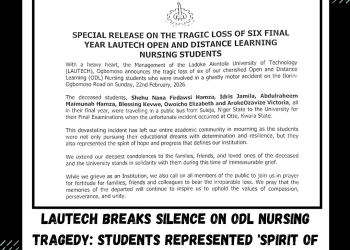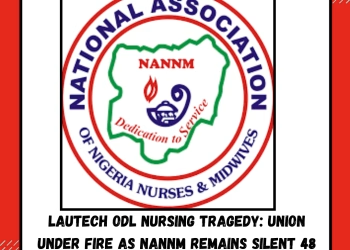By Ojebode Dorcas Ifeoluwa

Imagine walking into a hospital and finding you can’t enter a ward because there’s no ramp. Or trying to speak with a nurse and realizing there’s no interpreter to help you communicate. For many people living with disabilities, this is not imagination…it’s everyday reality. Hospitals should heal, not create obstacles.
I’ll never forget seeing a father struggling to push his son’s wheelchair through a narrow doorway. Every inch was a fight. Two nurses had to step in to help. That moment stayed with me. Small barriers can have a big impact, and true inclusion is about more than just infrastructure, it’s about respect, awareness, and empathy.
A disability-friendly hospital is one where no one (patient, staff, or visitor) feels limited by their environment. Ramps, elevators, accessible toilets, clear signage, and assistive devices matter but so do attitudes, training, and policies that make everyone feel safe and valued.
As nurses, we see gaps others might miss: high counters, inaccessible beds, or staff unsure how to communicate with patients who are deaf or visually impaired. Our perspective lets us spot what truly needs to change and advocate for it every day.
But advocacy isn’t just for nurses. Everyone has a role to play whether as administrators, engineers, policymakers, disability advocates, families, and patients themselves. Together, we can create hospitals that truly welcome everyone.
Here’s how we can act:
Nurses should notice barriers, report them, and speak up for patients in daily care and in meetings.
Hospital management should conduct accessibility audits, make small but meaningful changes like ramps, signage, and accessible toilets, and provide staff training on inclusion.
Policymakers should support inclusive health policies, standards, and infrastructure funding.
Everyone else should share experiences, raise awareness, and encourage inclusion wherever they can.
Hearing real voices makes the issue tangible. One staff member who uses crutches said, “I love my job, but getting to the ward every day feels like climbing a mountain.” Stories like this remind us why inclusion matters.
While many African hospitals are still catching up on accessibility, small changes make a big difference. Simple adjustments restore dignity, autonomy, and trust as values every hospital should uphold.
A truly inclusive hospital is one where every person regardless of ability feels seen, safe, and supported. We may not fix every barrier overnight, but one corridor, one voice, one small action at a time moves us closer.
Because inclusion isn’t just policy, it’s love in practice.
Have you noticed accessibility challenges in your hospital or clinic? What small change could make the biggest difference whether you’re a nurse, manager, policymaker, or visitor?
Fellow Nurses Africa is the independent voice of African nursing. We educate, inform and support nurses across Africa.










